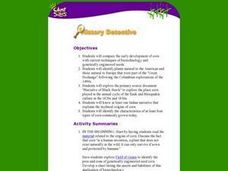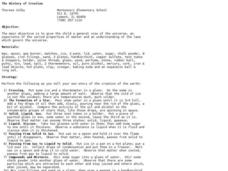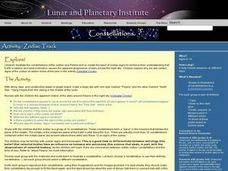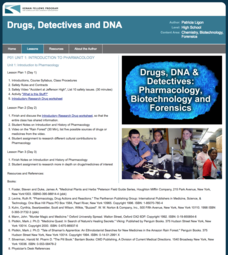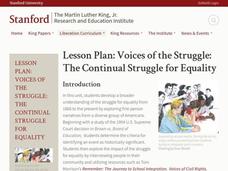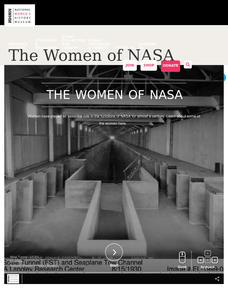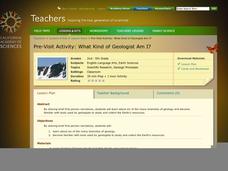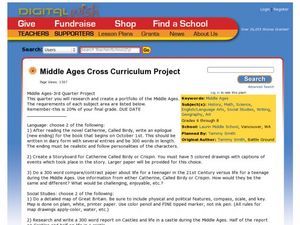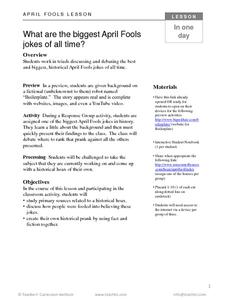Curated OER
High Performance in Agriculture Science: Graduates Outperform Others
Students plan for their future by exploring occupational experience programs.In this career lesson students list activities that they will participate in in the future and complete a career exploration project.
Curated OER
Dino History
Students create a timeline of the times dinosaurs lived. In this dinosaur timeline lesson plan, students research the various periods when dinosaurs lived. Students work in groups to research the dinosaurs of a specific time...
Curated OER
History Detective
Middle schoolers study the effects of the Great Exchange on the Americas.
Curated OER
The History of Creation
Students explore the properties of matter. In this lesson about matter, students will do a series of experiments to enable them to understand about creation of the universe. In these some of the experiments students will makes stars,...
Curated OER
Fossil History
Students examine the similarities and differences between living organisms and fossils. In this fossil lesson students reenact the process of creating a fossil.
Curated OER
Ancient Bugs
Learners describe Archaea. In this biology lesson, students examine biological communities and the role Archaea plays. Learners will compare and contrast the Archaea with bacteria and eukaryote.
Curated OER
Space Shuttle Science
Students study the nomenclature, operation and purpose of America's Space Transportation system. They demonstrate how water can be broken down into its component gases of hydrogen and oxygen by electrolysis. They construct and use the...
Curated OER
Life in Ancient Mesopotamia
Students reconstruct and make drawings of vessels in the same manner as an archaeologist. In this archaeologist lesson plan, students each get a piece of a broken pot and they have to work together to put it back together. Once it is...
Curated OER
Space Science: Zodiac Track
Young scholars create posters of the constellations using glow-in-the-dark glue and black paper. They hang their posters around the room starting with Aries and moving through all the signs. Students create a jingle or acronym to help...
Curated OER
Applied Science - Technology (3A) Post Lab
Third graders discuss how energy is created. In this energy lesson, 3rd graders look at how a city receives energy and how it is made. They create their own generator using a pin wheel and pipe cleaners.
Museum of Tolerance
The Role of Citizens in a Participatory Democracy
Groups research participatory democracies and compare the role and rights of citizens in ancient history with those in recent U.S. history. Guided by a series of questions, individuals compose a persuasive essay in which they discuss the...
Teach Engineering
Red Rover Robotics
Help your class understand the importance of exploration using robots. with a resource that provides a short history of robotics as a lead into looking at Martian robotic exploration missions. The activity specifically looks at the...
Kenan Fellows
Unit 1: Introduction to Pharmacology
Learn about the study of medications, including those found in nature and those made synthetically. The first of four lessons in a series on pharmacology includes lectures, hands-on experiments, research, and more.
Curated OER
Compare and Contrast Night to Life is Beautiful
After reading Elie Wiesel's Night, watching the movie Life is Beautiful, and researching World War II, class members write a comparison essay on the book and film. This includes a prior knowledge activity, discussion in whole and small...
Stanford University
Voices of the Struggle: The Continual Struggle for Equality
As part of a study of the Civil Rights Movement from 1868 to the present, class members examine first person narratives, the Supreme Court case Brown v. Board of Education, and other significant events in civil rights history....
Fluence Learning
Writing an Argument: The NIEHS
Should the work of the National Institute of Environmental Health Sciences be funded by the government? Middle schoolers weigh in on the status of federal funding for programs that protect the environment with three text passages...
National Woman's History Museum
The Women of NASA
Human computers? Although it may sound like science fiction, the term was used to describe the women who made the NASA calculations before the advent of electronic computers. A 21-slide presentation introduces viewers to the women who...
California Academy of Science
What Kind of Geologist Am I?
Transform your class into young geologists as they learn about six different branches of geology. Using the included geology career descriptions and picture cards, learners work in small groups deciding which tools and locations fit...
American Museum of Natural History
Theodore Roosevelt's Outdoor Adventures
Time for a virtual sightseeing trip. Pupils explore the Grand Canyon, Devil's Tower, and Yosemite Valley in an interactive online experience. They answer questions about the organisms in each location and draw conclusions based on their...
Teach Engineering
Airplanes Everywhere: Land! Water! Sky! Oh, My!
How important is aviation? Using the background information, teachers provide the class with a brief history of aviation. The class discusses how airplanes are important to the area of transportation in the 17th installment of a...
Curated OER
Middle Ages Cross Curriculum Project
Middle schoolers complete several projects on the Middle Ages. In this world history lesson, students complete language arts, social studies, math, and science projects. Some of these include: comparing a teenager's life now to that in...
TCI
What Are the Biggest April Fools Jokes of All Time?
After working in groups to analyze primary sources related to a historical hoax, learners will discuss how people managed to be fooled and work to identify one of the biggest April Fools jokes in history.
The New York Times
Investigating the Heroin and Prescription Opioid Epidemic
How bad is the opioid crisis in America? Has it gotten worse in the last few decades? Why? High schoolers delve into these questions with a thorough and thoughtful lesson from The New York Times on heroin prescription opioids....
Constitutional Rights Foundation
Why Don’t More People in the U.S. Vote?
To vote or not to vote, that is the question. Secondary scholars explore voter turnout in the United States. The resource uses informational text, group discussion, and a worksheet to help academics understand hindrances to voting...
Other popular searches
- History of Science
- History of Science Museums
- The History of Science
- History of Science Nuclear
- History of Science Physics
- History of Science Georges
- History and Nature of Science
- History and Social Science
- History Social Science
- Ancient Science Inventions
- History and Science Fiction
- History of Forensic Science


